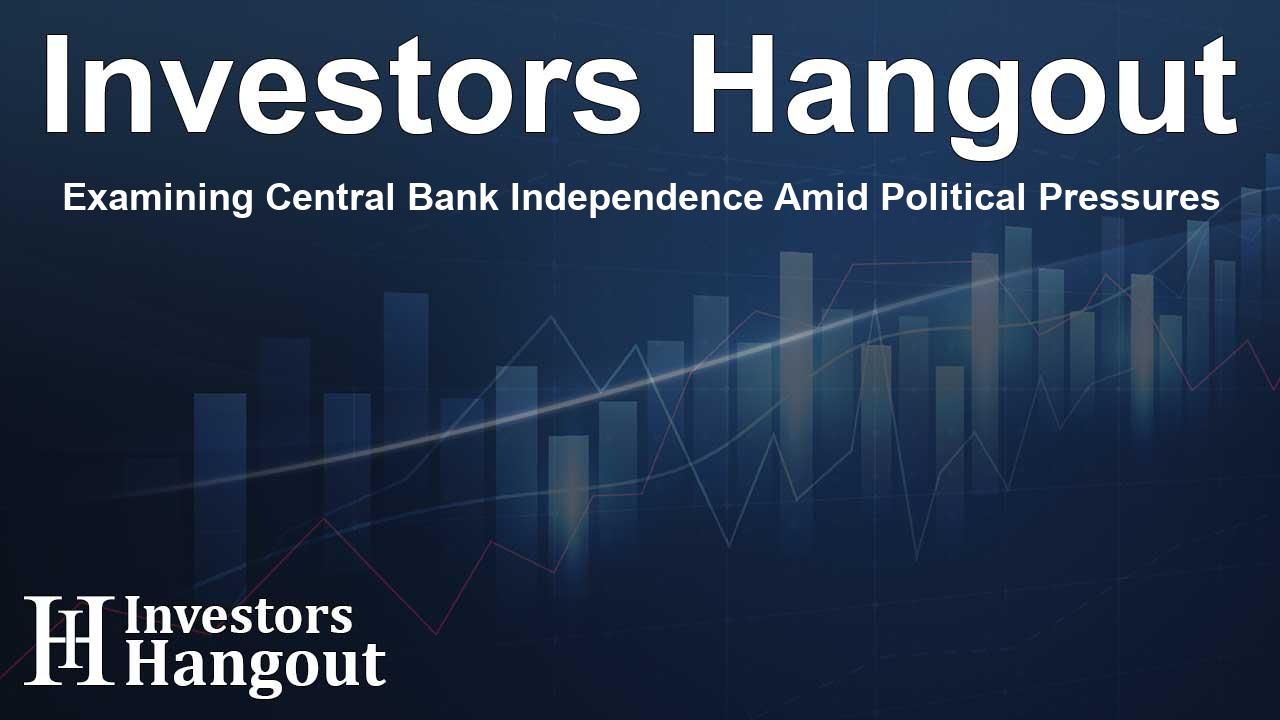Examining Central Bank Independence Amid Political Pressures

Understanding Central Bank Independence in Today’s Economy
The discussion surrounding central bank independence has resurfaced, particularly in light of current political climates. Observers are keenly watching as the Federal Reserve's role could be significantly impacted by potential changes in governance.
Recent statements from key political figures suggest a shift in perception regarding the Federal Reserve's operational autonomy. The notion that the sitting president should have influence over Fed decisions marks a departure from traditional economic theory that advocates for a clear division between government and monetary policy.
The Theoretical Framework of Central Banks
Ideally, central banks operate based on objective economic data, shielded from political pressures. However, the reality often paints a different picture. Over recent decades, as central banks embraced inflation-targeting strategies, their independence has been increasingly scrutinized, especially during times of economic turmoil.
Response to Economic Crises
The Global Financial Crisis and the COVID-19 pandemic saw a concerted effort from both fiscal and monetary authorities to stabilize economies. Such collaboration has, to some extent, blurred the lines of central bank independence. The interventions implemented during these crises are often credited with averting deeper economic problems.
Government Debt and Inflation Concerns
Despite the necessary measures taken, the rapid increase in government debt remains a significant concern. Governments, while acting in the interests of economic stability, have amassed large debts, leading to questions about future inflation—one of the core mandates of central banks. The concerns over maintaining low inflation are now compounded by the economic realities faced by many nations.
Inflation Dynamics Post-Crisis
Following aggressive stimulus programs, inflation initially surged, but many analysts note that it was kept in check for years prior to recent increases. The confluence of vast money supply, combined with supply chain disruptions and geopolitical tensions, notably shaped the inflation trajectory.
Central banks have had to navigate these turbulent waters, often caught between the necessity for supportive economic policies and the imperative to control inflation. The ongoing adjustments indicate that central banks, while seeking to uphold their independence, remain intrinsically tied to governmental fiscal measures.
Debate on Monetary Policy Governance
Intellectual discourse surrounding central bank independence is evolving. Noted economists like Robert Skidelsky propose that monetary matters should also fall under governmental purview, drawing parallels with fiscal policy. This politicization of monetary policy raises crucial questions about accountability and efficacy in decision-making.
International Perspectives on Central Bank Independence
Comparisons with other countries yield interesting insights. For instance, the Monetary Authority of Singapore operates on a framework that underscores coordinated policy efforts yet lacks full independence. Its government retains significant influence, contributing to favorable economic outcomes without an entirely independent central bank.
Central Banks in the New Economic Landscape
Current global dynamics suggest that central banks are increasingly interlinked with their respective governments, reflecting a practical approach to economic policy. While they may present themselves as independent entities, the collaboration with governments is evident, particularly during crises.
Potential Implications for Future Policies
As governments confront ongoing economic challenges, the question of central bank independence versus governmental influence continues to resonate. The balance between addressing immediate economic needs and maintaining long-term stability is intricate and will shape the evolution of monetary policy.
Frequently Asked Questions
What is central bank independence?
Central bank independence refers to the ability of a country's central bank to operate without direct political pressure, making decisions based solely on economic data.
Why is central bank independence important?
Independence is crucial as it helps maintain stability in monetary policy, controlling inflation and fostering trust in the financial system.
How do political decisions influence central banks?
Political decisions can influence central banks when leaders advocate for changes in monetary policy, potentially undermining the notion of independence.
Have central banks become more politically influenced?
Yes, global crises like the financial crisis and the pandemic have led to closer collaborations between central banks and governments, impacting their independence.
What could be the future of central banking?
Future central banking practices might see a blend of independence and governmental cooperation to address economic challenges effectively and responsibly.
About The Author
Contact Dylan Bailey privately here. Or send an email with ATTN: Dylan Bailey as the subject to contact@investorshangout.com.
About Investors Hangout
Investors Hangout is a leading online stock forum for financial discussion and learning, offering a wide range of free tools and resources. It draws in traders of all levels, who exchange market knowledge, investigate trading tactics, and keep an eye on industry developments in real time. Featuring financial articles, stock message boards, quotes, charts, company profiles, and live news updates. Through cooperative learning and a wealth of informational resources, it helps users from novices creating their first portfolios to experts honing their techniques. Join Investors Hangout today: https://investorshangout.com/
The content of this article is based on factual, publicly available information and does not represent legal, financial, or investment advice. Investors Hangout does not offer financial advice, and the author is not a licensed financial advisor. Consult a qualified advisor before making any financial or investment decisions based on this article. This article should not be considered advice to purchase, sell, or hold any securities or other investments. If any of the material provided here is inaccurate, please contact us for corrections.
